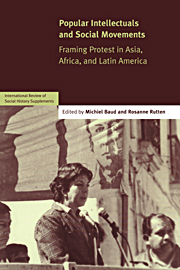Book contents
- Frontmatter
- Contents
- List of Contributors
- Introduction
- Framing, Transnational Diffusion, and African-American Intellectuals in the Land of Gandhi
- Indigenous Communists and Urban Intellectuals in Cayambe, Ecuador (1926–1944)
- Reforming Mysticism: Sindhi Separatist Intellectuals in Pakistan
- Unemployed Intellectuals in the Sahara: The Teshumara Nationalist Movement and the Revolutions in Tuareg Society
- Between Sovereignty and Culture: Who is an Indigenous Intellectual in Colombia?
- Critics and Experts, Activists and Academics: Intellectuals in the Fight for Social and Ecological Justice in the Narmada Valley, India
- Framing Jihad: Intramovement Framing Contests and al-Qaeda's Struggle for Sacred Authority
- Popular Publics: Street Protest and Plaza Preachers in Caracas
- Concluding Remarks: Framing Protest in Asia, Africa, and Latin America
Unemployed Intellectuals in the Sahara: The Teshumara Nationalist Movement and the Revolutions in Tuareg Society
Published online by Cambridge University Press: 04 August 2010
- Frontmatter
- Contents
- List of Contributors
- Introduction
- Framing, Transnational Diffusion, and African-American Intellectuals in the Land of Gandhi
- Indigenous Communists and Urban Intellectuals in Cayambe, Ecuador (1926–1944)
- Reforming Mysticism: Sindhi Separatist Intellectuals in Pakistan
- Unemployed Intellectuals in the Sahara: The Teshumara Nationalist Movement and the Revolutions in Tuareg Society
- Between Sovereignty and Culture: Who is an Indigenous Intellectual in Colombia?
- Critics and Experts, Activists and Academics: Intellectuals in the Fight for Social and Ecological Justice in the Narmada Valley, India
- Framing Jihad: Intramovement Framing Contests and al-Qaeda's Struggle for Sacred Authority
- Popular Publics: Street Protest and Plaza Preachers in Caracas
- Concluding Remarks: Framing Protest in Asia, Africa, and Latin America
Summary
Summary: In the past four decades the Tuareg, a people inhabiting the central Sahara, experienced dramatic socioeconomic upheaval caused by the national independence of the countries they inhabit, two droughts in the 1970s and 1980s, and prolonged rebellion against the state in Mali and Niger in the 1990s. This article discusses these major upheavals and their results from the viewpoint of three groups of Tuareg intellectuals: the “organic intellectuals” or traditional tribal leaders and Muslim religious specialists; the “traditional intellectuals” who came into being from the 1950s onwards; and the “popular intellectuals” of the teshumara movement, which found its origins in the drought-provoked economic emigration to the Maghreb, and which actively prepared the rebellions of the 1990s. By focusing on the debates between these intellectuals on the nature of Tuareg society, its organization, and the direction its future should take, the major changes in a society often described as guarding its traditions will be exposed.
INTRODUCTION
“In this still untamed Sahara – among the camel herdsmen, young Koranic students, government officials, and merchants now anticipating a more peaceful and prosperous future – we were seeking rhythms of life unbroken since the time of Muhammad, 1,300 years ago.”
When the Tuareg rebellions in Mali and Niger ended in the second half of the 1990s, journalists set out to look for the unchanging character of Saharan life, ruled by tradition and ways as old as mankind.
- Type
- Chapter
- Information
- Popular Intellectuals and Social MovementsFraming Protest in Asia, Africa, and Latin America, pp. 87 - 110Publisher: Cambridge University PressPrint publication year: 2005



